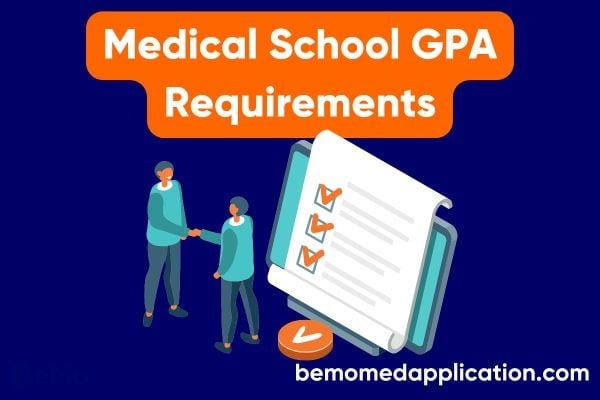Medical school GPA requirements are one of the most important factors for medical school admissions, which is why many premeds wonder if their grades are competitive enough to meet admissions standards. The admissions committee looks at your GPA and MCAT score to assess your academic readiness and to judge if you have an aptitude for medical sciences. In this blog, I will share with you current medical school GPA requirements and admissions data, the importance of having a high GPA, and how medical schools evaluate your academic performance.
>>Want us to help you get accepted? Schedule a free initial consultation here <<
Listen to the blog!
Admissions Data and GPA Requirements for Every Medical School
Every medical school in the US will have their own GPA requirements, so it's important to check individual program websites for the most up-to-date information. Below you can find the average, lowest accepted, and highest accepted GPA at all medical schools for a fuller picture:

What are Medical School GPA Requirements?
Most medical schools require a minimum cumulative GPA of at least 3.0 on a 4.0 scale. But while we can consider 3.0 the minimum requirement to get into medical school, generally speaking you want to aim a little higher. Look at the median GPA scores in the table above. These numbers are your guide to the minimum GPA you should aim for when applying to those specific medical schools. If your GPA does not meet or beat the average GPA of accepted applicants, your chances of acceptance are much lower.
Here's an overview of the average GPAs of med school matriculants: according to the AAMC, for the incoming accepted matriculating allopathic students, the average science GPA is 3.71, the average non-science GPA is 3.85, and the average total GPA is 3.77.
On the DO side, according to AACOM, the average science GPA is 3.46, the average non-science GPA is 3.67, and the average total GPA is 3.55. While the GPA on the osteopathic side is lower, the academic rigor of learning medicine is not easier in any way, shape, or form compared to the allopathic side.
How Do Medical Schools Calculate GPA?
Types of Medical School GPA
The GPA that is most important when applying to medical school is your science GPA. That is the GPA of all your science-based courses (Biology, Chemistry, Physics) combined.
Your non-science GPA accounts for all your non-science courses such as English, Philosophy, etc. And, lastly, is your cumulative GPA, which averages the prior two GPAs.
Going through college, we all have taken those “easy” courses to help you get a bit of a GPA booster (thank you, Piano 101!) where, for the most part, showing up and doing the assignments gets you an “A”. Medical schools are aware of this, and by adding up your science-based courses into its own separate GPA, you do not have inflation from those easier courses. Hence, its emphasis and correlation that medical schools use to gauge your preparedness.
How Medical Schools Evaluate GPA
Medical schools will consider all three types of GPA when evaluating your application, to determine whether your academic performance is up to their standards and how prepared you will be for medical school. However, admissions officers also take into account factors such as upward trends in your GPA and coursework rigor. So, if your GPA started low in your freshman year of college, you can still bounce back and bump your GPA back into a competitive range.
Moreso, some medical schools will consider your graduate GPA. So if you enroll in a post-bacc program or decide to get a graduate degree before medical school, this can help you prove that you're able to handle higher-level coursework or that you've worked to improve a lower GPA.
Medical schools also take note if you score exceptionally well on your MCAT, or have extensive and impressive extracurriculars, which can help offset a lower GPA.
What is a Competitive GPA for Medical School?
From my experience when discussing with prior classmates, at most medical schools, a competitive total GPA would be a 3.8 to try and cover most requirements or minimum cut-offs. A low total GPA for most medical schools would likely be anything under 3.5.
And while your GPA is a big factor in your application, it is still possible to get into medical school with a low GPA. Other factors such your MCAT score, prior experiences, and your background are also just as important. In addition to your academic ability, medical schools want to see that you are also a well-rounded individual, taking prior experiences such as shadowing, premed research, and volunteer work to understand that you have important analytical and communication skills vital to the medical profession.
Want to know how to get into med school with a low GPA?
Why it's Important to Have a High GPA for Medical School
The core reason why your GPA matters so much to medical schools is that it is an indication of your academic ability. Your GPA is often the very first deciding factor when admissions committees evaluate applicants, for this reason.
Let’s be honest; medical school is tough. The transition of taking on the academic load is not an easy feat. The transition from high school to college is tough, but pales in comparison to the transition from undergraduate studies to medical school.
This is why having a high GPA is crucial for your success in medical school. While medical school tuition is not cheap by any means, medical schools are pouring a lot of time and resources into each student to ensure success and help build the next generation of physicians that are needed to help with our ever-aging populations. Thus, a higher GPA proves to them you are prepared for that transition; your high GPA is a testament of your academic rigor, self-discipline, and ability to understand complex material at a high level.
How My GPA Affected My Medical School Application
My GPA going into medical school was a science GPA of 3.81, non-science GPA of 3.91, and a cumulative GPA of 3.86. My GPA made a significant impact on where I applied. I stuck to schools I felt confident I had a good chance at getting an interview. Additionally, I did not apply to any programs that had average accepted GPAs above my own due to financial reasons.
I made sure to evaluate and compare my GPA and MCAT scores to the average matriculated students for those schools, which usually can be found on MSAR for MD programs and ChooseDO for DO schools. This information can be found on individual program websites for Canadian programs. I do believe my GPA helped my application significantly and proved to admissions committees that I was ready for the rigors of medical school.
Medical School GPA Requirements in Canada
For medical schools in Canada, the GPA requirements can be a bit more nuanced. Many provinces have a lower GPA requirement for their in-province applicants, partly to encourage premeds to go to medical school and practice in their home provinces.
For example, for the University of Alberta Faculty of Medicine and Dentistry, their GPA requirements for their Albertan applicants is 3.30, as opposed to 3.50 for their non-Albertan applicants.
With the readily available matriculant data from Canadian medical schools, the average cumulative medical school GPA for matriculants is 3.87. For many Canadian medical schools, a science GPA is not readily available. Additionally, there are some programs that use a percentage as your GPA (University of British Columbia, for example), as well as some programs that go off a 4.50 GPA scale (University of Manitoba, for example).
Why we think GPA and MCAT should be banned from med school admissions:
FAQs
1. How important is my GPA for medical school admissions?
Your GPA is one of the most important criteria for your medical school application. Some schools even use a minimum GPA requirement (often along with minimum MCAT scores) to filter out applicants at the primary application stage. At the same time, remember that GPA is not the only thing that matters. Schools consider your other application components in conjunction with your GPA.
2. What is the average accepted GPA for US medical schools?
According to the AAMC, the average accepted GPA for medical schools in the US is 3.77.
3. Can I be accepted to medical school with a low GPA?
While there’s no doubt that a high GPA can give you a competitive edge for medical school, it’s still possible to get into medical school with a below average or average GPA if you can prove your academic prowess and suitability for medical school via other application components.
4. Is my science GPA more important than my overall GPA?
While some schools ask for and emphasize the importance of your science GPA, others only look at your cumulative GPA. Some programs have unique requirements and in fact calculate their own GPAs, after asking you to input your transcript, based on various factors. Check the admissions websites of the schools you’re applying to so you can keep track of what kind of GPA they require.
5. What is considered a competitive GPA for medical school?
A GPA of 3.5 is the “average” for medical school so any GPA of 3.6 or above would be above average and hence, competitive. However, keep in mind that this number is not universally applicable, and the actual expectation can vary widely between schools. The most elite, competitive programs such as the ones at Ivy League medical schools would have higher average accepted GPAs.
6. What GPA do I need for Canadian medical schools?
Many Canadian medical schools have higher GPA requirements for out-of-province students. Also, some schools have their own GPA scales and re-calibrate student GPAs based on this scale, so it's difficult to calculate a precise average that takes all schools into account.
7. Should I take a gap year if I have a low GPA?
If you have an overall weak application, with an average MCAT score, and you are not a competitive candidate for all the schools you’re targeting, then a gap year could provide you the opportunity to work on your application, and especially to improve your overall GPA.
8. How can I improve my GPA?
If you want to improve your GPA, focus on building good study habits and pick your courses strategically so you can meet medical school requirements while also achieving and maintaining a high GPA. If your GPA is low and it’s too late to improve it, make sure you do well on other med school application components such as the MCAT, extracurriculars, the interview, and so on.
To your success,
Your friends at BeMo
BeMo Academic Consulting
Disclaimer: Although we have made every effort to provide the most accurate information, admissions information changes frequently. Therefore, we encourage you to verify these details with the official university admissions office. You are responsible for your own results. BeMo does not endorse nor affiliate with any official universities, colleges, or test administrators and vice versa. If you see an error here, please notify us with the updated information, and we’ll send you a FREE copy of a BeMo ebook of your choosing! You can receive our Ultimate Guide to Med School Admissions, our Ultimate Guide to MMI Prep, our Ultimate Guide to Medical School Personal Statements & Secondary Essays or our Ultimate Guide to CASPer Prep! Please email us at content@bemoacademicconsulting.com with any corrections, and we’ll arrange to send you your free ebook upon confirming the information.

